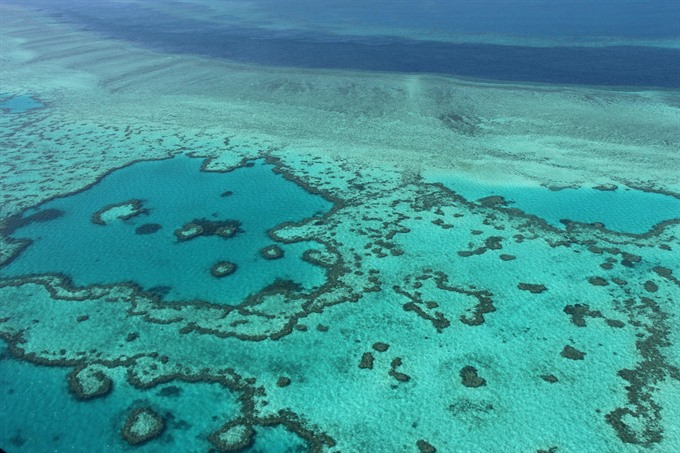 World
World

The Great Barrier Reef is "not dying", Australia insisted today as it updated UNESCO on efforts to protect the natural wonder while scientists blasted a lack of urgency in dealing with climate change.
 |
| This file photo taken on November 20, 2014 shows an aerial view of the Great Barrier Reef off the coast of the Whitsunday Islands, along the central coast of Queensland. — AFP/VNA Photo |
SYDNEY — The Great Barrier Reef is "not dying", Australia insisted today as it updated UNESCO on efforts to protect the natural wonder while scientists blasted a lack of urgency in dealing with climate change.
Canberra last year narrowly avoided the UN body putting the site on its endangered list and was ordered to report to the World Heritage committee by December 1 on its "Reef 2050" rescue plan.
The giant ecosystem -- a major tourist attraction -- is under pressure from farming run-off, development, the crown-of-thorns starfish and climate change, which led to its worst-ever bleaching event this year that devastated swathes of coral.
In the report, the government said 32 of the plan’s 151 actions to improve the reef had been achieved. Another 103 were under way, four were delayed, and 12 were not yet due.
"When we came to government we inherited a reef on UNESCO’s endangered watch list," Environment Minister Josh Frydenberg said.
"We’ve done everything possible since that time to put in place a plan, to invest huge amounts of resources to improve water quality, to work with the farming community to tackle the crown-of-thorns starfish and to preserve this natural wonder of the world.
"We have to put the facts on the table," he added. "The reef is not dead, it’s not dying, it’s resilient, it’s healthy and we’ve made great strides forward in the last few years."
The government has committed more than Aus$2.0 billion (US$1.5 billion) to protect the reef over the next decade with the update highlighting progress on land management practices to prevent sediment run off, which helps spawn the coral-eating starfish.
It also pointed to a ban on sea-based disposal of dredge material in the area and restrictions on new port developments.
But the rescue plan included no new funding or commitments to tackle climate change despite acknowledging this was the reef’s biggest threat.
This year’s bleaching, due to warming sea temperatures, killed two-thirds of shallow-water corals in the north of the 2,300-kilometre long reef, although central and southern areas escaped with less damage. — AFP